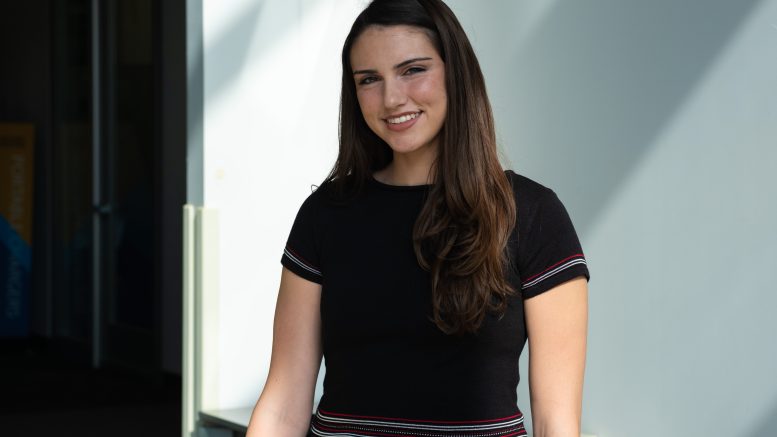Second-year medical student Jessica Dyck spent her summer in the BSc Med program on a project that could reshape psychiatric care. She is part of a randomized controlled trial (RCT) titled Patients Before Paperwork, which tests whether human or artificial intelligence (AI) scribes can best reduce the administrative load carried by psychiatrists.
The BSc Med program allows medical students to conduct research between their first and second years. Dyck joined the project after seeing its description in a list of abstracts. “I have a bit of experience being a medical scribe, so I thought it was right up my alley,” she said.
“All physicians have to take notes of their clinical encounters,” both for legal reasons and continuity of care, Dyck said. “A scribe does those notes for them, but […] can also function as an assistant” helping with referrals or prescriptions, she explained. Having a scribe can make a big difference in how much time a doctor is able to spend directly with a patient.
The study is led by Jitender Sareen, a professor and the department head of psychiatry at the U of M. Sareen highlighted that the work has three major goals. “One, improve the quality of patient care […] two, to reduce the administrative burden on the psychiatrist,” and three, to reduce the long “waiting times for our population.”
The trial will recruit 10 psychiatrists, who will rotate through three one-month conditions: no scribe, a human scribe and an AI scribe. The order will be randomized, with some starting with human scribes and others with AI scribes. Researchers will then compare outcomes such as physician workload, patient satisfaction and time spent in face-to-face interaction.
Sareen said the burden of paperwork is one of the largest barriers in psychiatry today. “Often a psychiatrist meets with a person for an hour, hour and a half,” then spends another hour or two writing the report, he said. “If we can reduce that time for the writing, it frees up their time to either see more patients or reduce the amount of time they have to do work at home.”
Human scribes have been at work for years in U.S. hospitals and in several Canadian specialties, including cardiology and surgery. Sareen said they have proven effective at reducing doctor’s administrative strain. Now, AI scribes are beginning to enter clinics, raising questions about the limits of digital tools and the need for human support.
“The AI scribes or the digital scribes are starting to be implemented,” he said, “but there are certain things that you can’t really use a digital scribe to do, like go back and find lab work from another place.” Humans still play a valuable role.
The project is currently in the recruitment phase, with ethics approvals underway. Alongside the psychiatrists, the team is seeking undergraduate students to work as scribes and research assistants. For Sareen, that training pipeline is an important part of the study. It gives students the opportunity to explore “that early interest in a particular area of medicine.”
Dyck said she is excited about this project as “it has the ability to equally benefit patients and physicians.” The study will survey patients on how much of the visit was spent interacting directly with their doctor and whether they felt the quality of the visit improved, she explained. At the same time, the study will look at physician satisfaction and workload.
“This study, I feel, is very, very important,” emphasized Sareen. “Anything that we can do to reduce [the] waiting list for our populations to access mental health care” is important. It is also necessary, “trying to really look at using some of this new technology in the appropriate, safe manner, because there’s lots of risks with privacy and a range of different problems. So, part of our evaluation is also learning some of the challenges that can happen.”
If successful, Patients Before Paperwork will serve as a feasibility study for a larger RCT. The findings could shape how psychiatrists, and eventually other doctors, integrate human and AI scribes into practice.
The research team is in the recruiting phase right now. Students interested in human scribe or research assistant positions can contact the team at [email protected] for more information.


